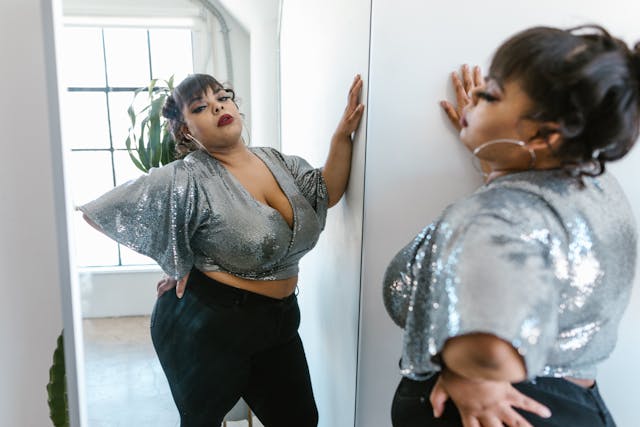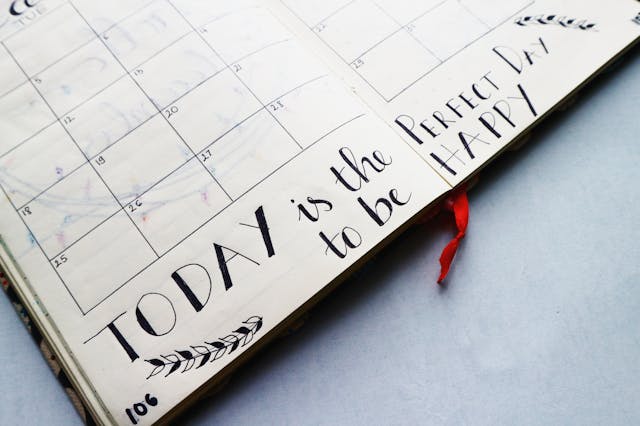15 Secrets To Instantly Boost Your Confidence

Confidence isn’t something you’re born with. It’s something you build—like a skill, one small choice at a time. It’s not about being the loudest in the room or having everything figured out. It’s about feeling secure in who you are, even when you don’t have all the answers.
The truth is, most people you think are confident are just practiced. They’ve learned how to show up, speak up, and carry themselves in a way that sends the message: I’ve got this. And the best part? You can learn that too.
If you’ve been doubting yourself, holding back, or waiting to feel “ready,” this list is for you.
15 Secrets To Instantly Boost Your Confidence
1. Stand Like You Mean It
How you hold your body sends messages to your brain and to the people around you. When you slouch, cross your arms tightly, or avoid taking up space, you signal fear or discomfort—even if you’re not aware of it. But standing tall with an open stance tells your brain: I’m safe. I’ve got this.
Straightening your posture also affects your breathing. When you stand upright, your lungs have more room to expand, which naturally helps you feel calmer and more in control. That physical change leads to a psychological shift, helping reduce feelings of anxiety and self-doubt.
Try checking your posture during everyday activities—on calls, while walking, or when waiting in line. Keep your head level, shoulders relaxed, and chest slightly lifted. It may feel forced at first, but over time, your body will naturally return to a stronger, more grounded position.
This small adjustment can have a big impact on how people perceive you—and how you perceive yourself. You don’t need to say anything. Let your presence speak first.
2. Practice Power Posing (Even in Private)
Before stepping into high-pressure situations, how you stand can affect how you perform. Power posing—holding a strong, expansive body position for two minutes—has been shown to lower stress and increase feelings of self-assurance. It’s a way to hack your body’s stress response before you even walk into the room.
Try standing with your hands on your hips, feet shoulder-width apart, and chest lifted. Or stretch your arms out above your head in a V shape. These poses make you feel bigger, and research suggests they can raise testosterone (linked to confidence) and lower cortisol (linked to stress).
The benefit isn’t just in hormone levels. When you take up space physically, you send a message to your brain that you belong in that space emotionally. It helps shift your focus from fear to readiness. Even if it feels strange at first, the impact can be surprisingly real.
Use this trick before interviews, meetings, public speaking, or even difficult conversations. You don’t have to do it in public—just two minutes in a bathroom stall or empty room is enough to change your mental state.
3. Speak Slower Than You Think You Should
Your tone and pace of speaking play a big role in how confident you appear. Speaking too quickly can make you seem nervous or unsure, while speaking slowly and clearly projects authority and thoughtfulness. It also helps people actually understand you better.
When you rush your words, you may lose control of your message. You might stutter, forget your point, or talk over others without meaning to. Slowing down helps you stay in control of the conversation and gives your words more impact.
Practice pausing briefly before answering questions or transitioning between thoughts. It shows you’re comfortable taking your time and that you’re not afraid of silence. That calmness is contagious—it helps others relax around you, too.
This habit also helps you feel more grounded. You’ll breathe better, think clearer, and appear more composed—all signs of real, lasting confidence.
Read More: 12 Habits That Damage Your Brain (Without You Realizing It)
4. Make Eye Contact (But Don’t Stare)

Eye contact is one of the most powerful nonverbal cues of confidence. It shows you’re paying attention, you’re open, and you’re not afraid to be seen. Avoiding eye contact, on the other hand, can signal insecurity—even when you’re doing everything else right.
Aim for gentle, steady eye contact that lasts about 3–5 seconds at a time. Break it occasionally to avoid making things uncomfortable, but don’t overcorrect by looking down or away too often. A good rule of thumb is to make eye contact when listening and when starting a sentence.
Pair your eye contact with warm facial expressions—like a soft smile or a raised brow to show interest. These small signals help you come across as approachable and emotionally present.
If making eye contact feels uncomfortable, practice in everyday situations like checking out at the store or talking to a friend. Confidence builds with practice, and this habit quickly becomes natural.
5. Focus on One Small Win
Confidence grows from doing, not just thinking. When you feel stuck or overwhelmed, the best way to spark self-belief is to take action—any action—and prove to yourself that you can follow through.
Start with something manageable. Maybe it’s speaking up in a meeting, making a difficult phone call, or sending that email you’ve been avoiding. Choose one small thing that challenges your fear, and do it with intention. That single act becomes a reference point for your brain to say, See? You handled that.
As these small wins stack up, your confidence becomes more solid. It’s not built on hype or fake affirmations—it’s built on actual experience. You don’t need to tackle everything at once. Just move forward one step at a time.
The next time you’re doubting yourself, pause and ask: What’s one thing I can do right now that would help me feel in control? Then do it. That’s how confidence starts.
6. Dress Like You Respect Yourself

You don’t need a fancy wardrobe to feel confident—but you do need to dress in a way that shows you care about yourself. Wearing clean, well-fitting clothes that match your personal style can change how you carry yourself and how others respond to you.
When you feel good in what you’re wearing, you project a sense of pride and readiness. You don’t have to constantly adjust your shirt or worry about how you look, which frees up your energy to focus on more important things—like what you’re saying and how you’re showing up.
Think of it as suiting up for your own life. Whether it’s a tailored blazer, your favorite hoodie, or clean sneakers—choose pieces that reflect who you are and make you feel secure. Even small upgrades like grooming, fresh breath, or adding a personal scent can boost your presence.
Looking your best helps you feel your best. And when you feel your best, you act with more confidence—no runway needed.
Don’t Miss: 10 Traits To Become a Respected Person in 2025
7. Stop Apologizing for Existing
It’s common to say “sorry” out of habit. We apologize for asking questions, speaking up, or even walking into a room. Over time, that pattern reinforces the belief that we’re inconveniencing others just by being ourselves.
Try replacing unnecessary apologies with stronger, clearer language. Instead of “Sorry for bothering you,” try “Do you have a minute?” Instead of “Sorry I’m late,” try “Thanks for waiting.” It’s a small switch, but it reclaims your power without sounding rude.
Being assertive doesn’t mean being aggressive. It means honoring your voice and space. You have a right to be heard and take up space, just like everyone else. When you stop shrinking to make others comfortable, you start building unshakable confidence.
Pay attention to how often you apologize when you don’t need to. Catch yourself, rephrase, and keep moving forward. It might feel awkward at first, but soon it becomes your new standard.
8. Practice Self-Talk Like You’d Talk to a Friend
That inner voice in your head? It’s shaping your self-image every single day. If it constantly tells you that you’re not good enough, it’s no wonder your confidence struggles. But here’s the thing—you’re in control of that voice.
Start by listening to how you speak to yourself when you make a mistake or face a challenge. Is your tone harsh, judgmental, or impatient? If so, pause and ask: Would I say this to a friend? If the answer is no, then you shouldn’t say it to yourself either.
Change begins with kind, realistic self-talk. You don’t have to lie to yourself with over-the-top affirmations. Just be encouraging. Replace “I always mess up” with “That didn’t go how I hoped, but I’m learning.” That’s how you begin to rebuild trust in yourself.
Confidence isn’t about never feeling doubt. It’s about refusing to let that doubt define you. Speak to yourself like someone who deserves compassion—because you do.
9. Learn Something New (Even for 10 Minutes)
Confidence grows when you prove to yourself that you’re capable—and one of the easiest ways to do that is by learning something new. It doesn’t have to be a major skill. Even reading a single article, watching a short tutorial, or trying a simple task you’ve never done before can make a difference.
The process of learning activates your brain’s reward system. It helps you feel more engaged, more capable, and more in control. And when you complete a new task, even a small one, your brain releases dopamine—the same chemical that boosts motivation and self-worth.
Make a habit of investing just 10 minutes a day into learning. That could mean reading a book, exploring a topic you’re curious about, or building a hobby. The point isn’t to master something overnight—it’s to remind yourself that you’re always growing. Growth reinforces self-trust, and self-trust is the foundation of confidence.
Over time, these micro-learning moments build up. You’ll start to see yourself as someone who is curious, competent, and never stagnant—and that’s someone who naturally radiates confidence.
10. Set Boundaries and Actually Stick to Them

One of the strongest confidence builders is knowing where your limits are—and honoring them. Boundaries aren’t about being cold or distant. They’re about protecting your time, energy, and peace. And when you stand by your boundaries, you reinforce to yourself that you matter.
It’s easy to fall into the trap of people-pleasing—saying “yes” when you want to say “no,” overextending yourself, or tolerating things that leave you drained. But every time you ignore your own needs to make others comfortable, your confidence takes a hit.
Start small. If something doesn’t sit right with you, speak up respectfully. If you need time to rest, take it. If a conversation makes you uncomfortable, it’s okay to redirect or excuse yourself. Each time you do this, you send yourself a powerful message: My comfort matters. My needs matter.
People will often respect you more when you have clear, healthy boundaries. More importantly, you’ll respect yourself more. And self-respect always leads to stronger confidence.
Don’t Miss: 10 Simple Ways To Look More Attractive
11. Visualize the Outcome You Want
Your brain responds to visualization almost as strongly as it does to real experiences. That means imagining yourself succeeding, handling stress well, or walking into a room confidently can prime your body and mind to perform at a higher level.
Before a big event, take a moment to close your eyes and walk yourself through the scenario. Picture yourself entering the space, smiling, speaking clearly, and feeling calm. Imagine what it looks, feels, and even smells like to succeed. This isn’t about fantasy—it’s mental preparation.
Visualization works because it creates neural pathways that make success feel familiar. When your brain “practices” the moment beforehand, your body follows with more ease and control. It’s a technique used by athletes, performers, and leaders to reduce fear and improve performance.
Make this part of your routine. Whether it’s a meeting, conversation, or personal challenge, mentally walk through it beforehand. See it going well, feel the confidence you want to bring—and then carry that energy with you when the moment comes.
12. Do a “Confidence Anchor” Ritual
Sometimes, you just need a quick, go-to way to shift your energy when nerves strike. That’s where a confidence ritual—or what some call an “anchor”—comes in. It’s a short, repeatable action that tells your brain: You’re safe. You’re ready. Let’s go.
This could be anything that centers you: taking three deep breaths, listening to your favorite song, repeating a grounding mantra, or clenching your fist and releasing it. The ritual doesn’t need to be dramatic—it just needs to be meaningful to you.
The point of an anchor is consistency. You do it before situations where you typically feel anxious—public speaking, interviews, or even difficult conversations. Over time, your brain begins to associate the ritual with calmness and readiness.
By the time you walk into that situation, your nervous system is already in a better state. It’s a simple trick, but one that helps you walk in with more control and a clearer head.
13. Surround Yourself with Confident, Supportive People
Confidence is contagious. When you spend time with people who believe in themselves—and in you—you start to absorb that mindset. On the flip side, being surrounded by negative, critical, or insecure energy can chip away at your self-esteem.
Take a look at who you interact with most. Do they build you up or bring you down? Do they cheer for your wins or constantly question your choices? You don’t need to cut everyone off, but you do need to be intentional about who gets the most access to your energy.
Seek out people who challenge you to grow, who listen without judgment, and who model the kind of confidence you’re trying to build. Watch how they handle setbacks, how they speak about themselves, and how they navigate life without constantly shrinking.
You become a reflection of your closest relationships. Choose people who reflect the confident, grounded, and kind person you’re becoming.
14. Stop Waiting for Perfect Timing
Perfection is a myth that robs people of progress. If you keep waiting for the right moment to act, speak, or show up, you’ll be waiting forever. Confidence isn’t about feeling ready—it’s about acting anyway, even when you’re scared.
Most people think confidence comes before action. In reality, it’s often the result of action. You do the thing, you survive it, and your brain learns: That wasn’t so bad. I can do it again.
Start before you’re ready. Say yes before your nerves talk you out of it. Trust that you’ll figure it out as you go. Confidence comes from movement, not stillness.
You don’t need all the answers to take the first step. Just take the step. The rest will meet you there.
15. Reflect on What You’ve Already Overcome
When doubt creeps in, it’s easy to forget how much you’ve already survived. That’s why it’s so important to pause and reflect on your personal wins—especially the ones that didn’t come easy.
Think back to a time you were nervous but did it anyway. A moment when you felt unsure, but still showed up. These stories are proof that you’re stronger than you think, and you’ve been building confidence all along—you just haven’t been giving yourself enough credit.
Journaling can help. Write down three past situations where you pushed through fear. Describe what you learned, how you handled it, and how far you’ve come since then. These reminders are like armor you carry into the next challenge.
You’re not starting from scratch. You’re starting from experience. And experience is the loudest form of confidence there is.
Frequently Asked Questions (FAQs)
- Can confidence really be boosted instantly?
Yes, certain techniques like posture adjustment, power posing, and speaking slower can have an immediate impact. These physical cues help shift your mindset in real time.
- I’m naturally shy—can I still be confident?
Absolutely. Confidence doesn’t mean being loud or extroverted. It means being secure in who you are, even if you’re quiet. Shy people can be deeply confident.
- How do I stop comparing myself to others?
Practice redirecting your focus. Instead of watching others, track your own growth. Reflect on how far you’ve come, not how far someone else is.
- What’s one small daily habit that builds confidence over time?
Celebrate small wins. Each time you complete a task, honor it. This builds momentum and helps your brain associate effort with success.
- What do I do when I feel nervous in social situations?
Breathe deeply, stand tall, and focus on listening. Shift the focus off yourself by being curious about others. Confidence often grows from connection.







